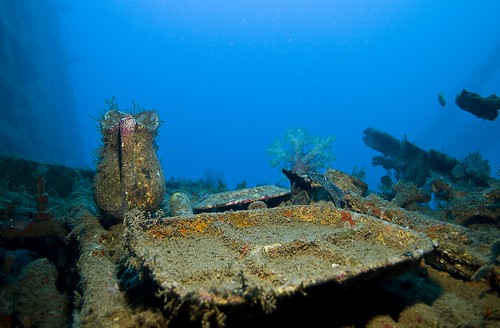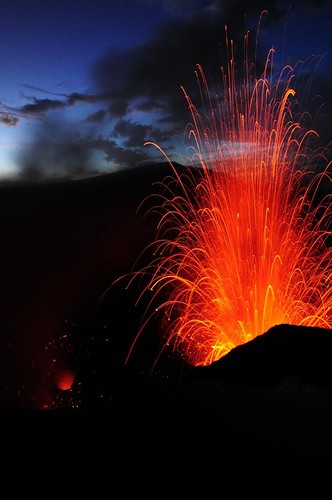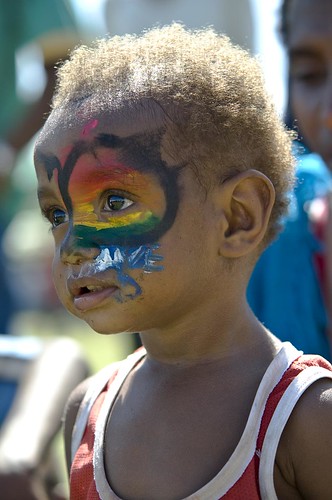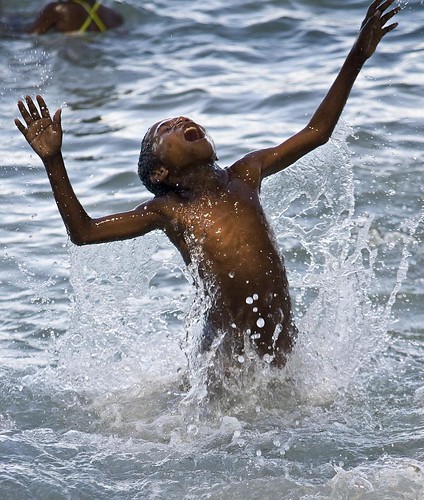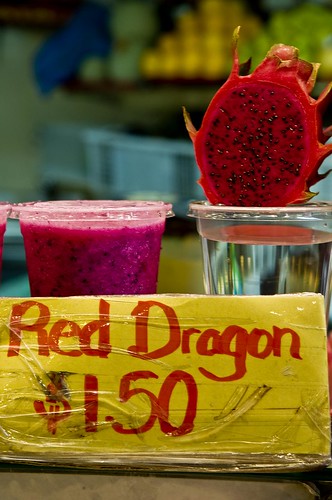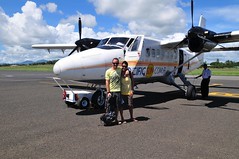
I have been trying for the last 2 months to come up with the right words to write about our trip through the South Pacific without any success, but I’ll do my best to accurately describe our impressions.
Even though the simplicity of the place can be synthesized to slow and backwards, our experience was way more complicated.
Long before the trip, we gathered every vital item required for our survival such as mosquito repellent, medicines for all sorts of stomach ailments, water purifier, etc. What we didn't have was a guide to help us deal with the huge and sometimes frustrating cultural differences, which could be better called “the culture shock”. So far the implications haven’t gone any further than developing our innermost dark sense of humor.
After 2 days in Tonga we were more than happy to board a plane to Fiji, where everything seemed possible, people were smiley and tourism is important. Once at the airport, we noticed the most remarkable characteristic of Fijians, they are incredibly friendly and they will go out of their way to make you feel welcomed.
The Queen of the Yasawas

For the first two weeks in Fiji, we purchased a ferry pass to island hop in the Yasawas, a chain of islands located on the northwest of Fiji. Mosquitoes, bulas, vinakas, and so reigned, as well as tourists and overpriced accommodation.
There is where we met Queen, a Fijian male who honors his name with pride, character, and looks. Queen was the host at Sunrise Resort, one of the village run hotels in the Yasawas.
The self proclaimed Queen Latifah’s lost brother, is always eager to show his “skills” such as singing, dancing, story telling (which include only stories about himself) and dog style swimming.

With the purpose of entertaining his guests, Queen has accumulated a vast repertoire of acts. One of the most popular ones is “The Turtle Island Escape”. Turtle Island is one of the world’s most famous resorts for celebrities.
According to Queen, slavery was the employment style of choice at the expensive resort, and after a few songs with his badly intonated voice, the story of his escape was the starring performance during dinner. From Oprah drinking Kava, to Jonh McCain following him to his new home, Queen proudly told a story of injustice, glamour, and greed.
Queen is not only a singer, dancer, storyteller, and dog swimmer, he is also a Hero. Besides being the example for many Turtle Island escapes, he also saves lives. One day, he went with a group of backpackers to explore a cave that consist of 3 relatively easy accessible chambers. The first chamber connects with the second one through an underwater tunnel that requires good swimming skills to cross. -Normally, I stay greeting all the local people around the cave- he said – but this time I felt something was wrong, something told me I had to go in the cave – Trusting his gut, Queen penetrated the cave and everything seemed fine, when he tried to dive through the tunnel that leads to the second part, he saw two Asian girls fighting for their lives, desperate, helpless, they were drowning, they didn’t know how to swim.
Without giving it any thought, Queen swam towards them and pushed them through to the surface saving their lives, and now he has two Asian friends that will always be thankful for his heroic action.
Soon after he told us the cave story, Queen was very excited about swimming and decided to provide swimming lessons to one of the guests. As he appeared in the water, it took us a while to define what our eyes were seeing, he had a sarong wrapped around his torso covering his chest accompanied with a well matched purple wrap to hold his hair and gave a demonstration of his perfect “dog swimming” technique.

Our last day at Sunrise Resort arrived, and of course, Queen cannot let his longer-term guests leave without a deserving going away show. The day of our departure he presented himself as the dancer and vocal of an improvised band formed by his staff. With flowers in our ears and plenty of pictures, we left Sunrise with the promise of sharing his story with the world.
Fijian ADDIn Fiji, Language didn’t represent a problem to us since English is their national language. Nevertheless, ADD appeared as a big personal inconvenience amongst Fijian people. Most Fijians have perfect short term memory, they are capable of repeating exactly what you said right after you said it, but it will take about 10 different explanations before they grasp the meaning of your sentences.
One day we were trying to cancel a hotel reservation in one of the not so nice Yasawa Islands, we walked into the reception and 3 nice ladies were there to assist us. After we explained that we had a reservation with them for 3 nights next week, they repeated our words and then said "but you still have to pay for tonight"; very patiently we repeated that the reservation wasn't for that night, it was for the next week and we needed to cancel it -it is for the 31st, today is the 26th- we said, once again they said we needed to pay for that night. As our words and patience to explain our situation started to wear down, I thought that perhaps their English wasn't that great after all, but no! They would repeat exactly what we just had said and still didn't make sense to them. Eventually we started enunciating everything slowly as if we were explaining 4 year olds how to add...10 explanations and 20 min later they understood it and replied in perfect English "ok, no problem, if you want your deposit back you need to contact your travel agent"....
Bula! Bula!
We always do our best to learn some local words, and this time wasn't the exception, the regular greeting is "Bula" for which you reply "bula", to say thank you'll say "Vinaka" for which you have to reply "Vinaka". But that's not as simple as it sounds, they have a few Bula songs, they have the tourists' Bula Dance, they have the locals' Bula dance, and most of their songs say something like Bula Vinaka, Vinaka, or Bula...we spent 5 weeks in Fiji, and every single day I woke up with the Bula song playing in my mind, every time we went to a new hotel they made us perform the bula dance, everywhere we went they'd say "Bula, Bula; every time I went to bed I had the Bula song in my head...Now we are in Indonesia and I still get glimpsing memories of the Bula song every once in a while.
Fiji TimeFijians have a very cunning phrase to justify delays and mistakes alike; this is “Fiji time”. Fiji time is very simple, just say “Fiji time if you are 1 hour late, Fiji time if after stating 3 times that you are vegetarian they served you meat, Fiji time if they don’t understand you, Fiji time if they forgot your name after being asked for it 6 times (no exaggeration), and why not? Fiji time if you punched one of them in the face after saying “Fiji time”.
Diving Fiji
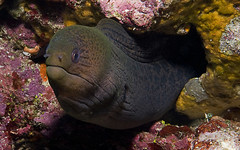
After the Yasawas, our journey through Fiji was far from over. We took a plane to Vanua Levu, the second biggest Island in Fiji. There, we stayed in a town called Savu Savu, which David says is one of the most beautiful places he’s ever been to and I agree. Green hills emerge from the calm ocean with colorful little houses and beautiful gardens.
Savu Savu is located in a small peninsula surrounded by a few small-inhabited islands and other peninsulas that protect it from strong currents; unlike the Yasawas, Savu Savu has regulations for fishing and protection of the reef life, which makes diving the area completely astounding. The marine landscape there is so beautiful that during our first dive at a site called “Dread Locks” I felt like crying. SCUBA is my favorite sport and in 13 years of being certified I had never seen such beauty. Soft coral galore as well as hard coral, nudibranches, crystal clear water, big fish, small fish, colors, etc.
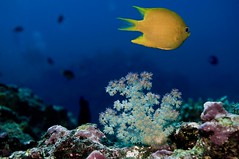
We spent a week in Savu Savu and got our Advance Diver certifications and then moved to Taveuni. The town is not as beautiful as Savu Savu, but diving is just as amazing. Our time in Taveuni wasn’t that enjoyable due to a nightmare experience with the diveshop of our hotel, Aquatrek Divers. I won’t get into details because I don’t want to feel angry. It is enough to say that they pretty much abandoned me in the middle of the ocean with one of the strongest currents we’ve been in and the dive guide didn’t notify anyone that I was missing. Luckily I was lost for only 35 min and the situation didn’t go further than being terrified and David yelling at the staff.

A few days in Taveuni were enough and then we took a ferry ride to Levuka, which is a very pretty little colonial town. Our hotel room made us feel like we were at the end of the 1800’s and our time there was quite enjoyable as well as diving, but nothing remarkable.
To finish our trip, we went to Bega Lagoon, a very famous spot for shark diving. Shark diving here is something to see, they don’t use cages, and the sharks are from 8 to 18ft long bulls, tigers, nurses, lemons, greys, and white tips. Brandon, the founder of Bega divers, the shop that began this shark feeding operation, explained that in order to achieve the right environment to dive with such a big group of sharks they have to begin with a few months preparation period previous to diving so that the sharks get used to the divers’ presence. For many years now, they have been successful with 0 rate of attacks and thousands of happy customers.
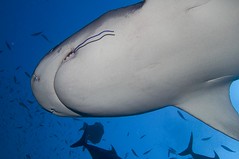
Once into the dive, every fear for sharks that even experienced divers could have somewhere deep inside disappears at the sight of such a professional operation. A staff of at least 6 guides surrounds the divers and makes sure that everyone stays in a safe place. Since I had the camera, I had a personal diveguard, who took me around to locate me at the most convenient spots to get good shots. Before the dive, Brandon told us that the chances of seeing the Tiger shark were low so I wasn’t expecting to see one, but there she was at the touch of my hand. She swam right above my head thanks to a good piece of tuna that the guides were holding out. I touched it, and I still can’t believe it, it was like a dream, but my pictures show it was not.

David was just as amused, he stayed at a higher spot where he could move back and forth more freely and got the opportunity to touch one of them as well. The view down there is overwhelming, a conglomeration of thousands of fish surrounds the feeding spot and the sharks break through the crowd showing who is the boss and get close, they do not
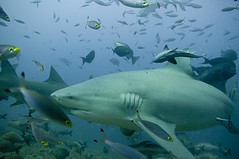
mind us, they look at you straight in the eye and when they do that, you realize that they know you are there, and that they can snack on you if they please.
Bega was the perfect closure to our 5 week stay in Fiji and became one of the places in the South Pacific where we will have to go back
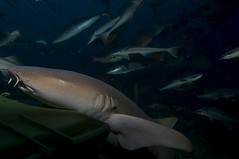
at some point. Sadly, one day after the shark adventure willing to have more encounters, we had to pack our stuff and go back to Nadi, where we to take a flight to our next country, Vanuatu.
ODD Facts
- All through the SP David was a star, groups of kids usually gathered behind him staring at his tattoos. During a hell-like ferry ride, teenagers took turns harassing him, one by one they’d go and sit near him and stare, not talk, just stare.
- You do not need to go to the circus to see a bearded woman; many Fijian women seem to be proud of their facial hair.
- Carbolicious. The Fijian diet is nothing fancy or balanced, it was common to eat ramen noodles with potatoes on top of white rice for every meal, sometimes we were lucky and got curried corn beef. This was the menu for the all-inclusive plan at the $100 per night accommodation in the Yasawas.
 One year ago I was packing all the stuff I could fit in my backpack, I was so frightened of the idea to have to walk miles while carrying it, the year ahead of me looked quite challenging in that aspect.
One year ago I was packing all the stuff I could fit in my backpack, I was so frightened of the idea to have to walk miles while carrying it, the year ahead of me looked quite challenging in that aspect.
 , not even dogs eat left overs in this "real word".
, not even dogs eat left overs in this "real word".











